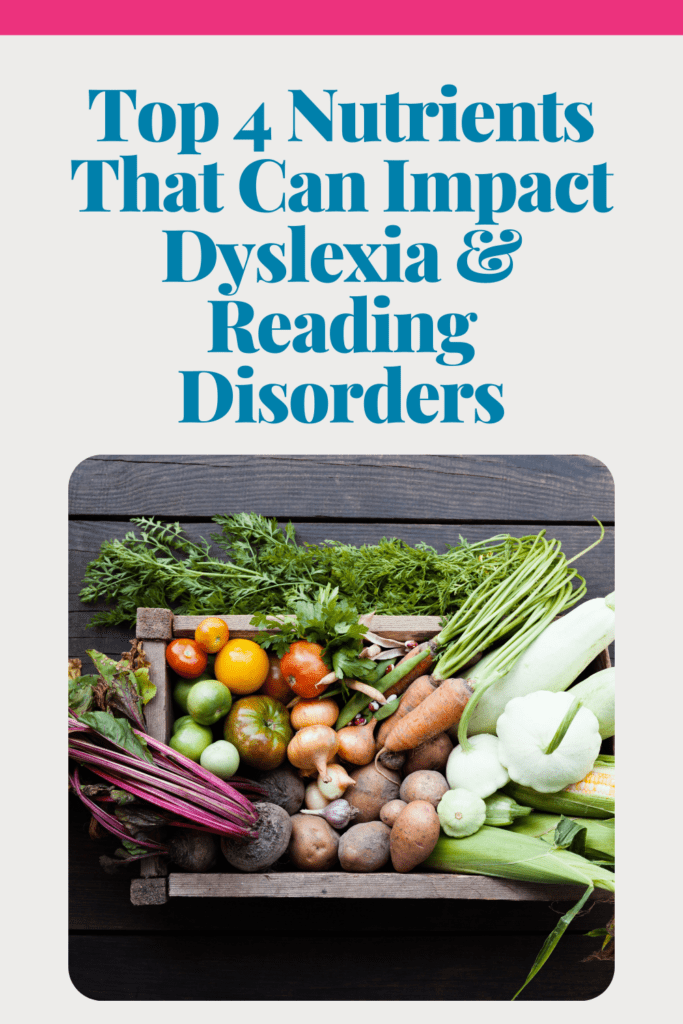By now almost all of us have heard about how food colouring, especially red dye, can be a nightmare for a child with ADHD.
When a child gets the ADHD diagnosis, Moms often know that there are other solutions like nutrition, exercise and adequate sleep before trying medication.
Yet when dyslexia is the diagnosis, somehow this is viewed as totally different from ADHD. Dyslexia is viewed as a disorder that is engraved in the structure of the brain while ADHD is viewed as having a little more flexibility.
ADHD is seen as a more medical issue with different treatment options while dyslexia is not considered medical but rather simply a brain or educational difference.
Why Do We Think Dyslexia Won’t Respond to Nutrition When ADHD Does?
If I tell a mom nutritional deficiencies can have a huge impact on ADHD – she doesn’t doubt it. Dyslexia or learning disabilities? She’s a little more unconvinced that this could make a difference.
… and yet there are piles and piles of research that date back decades about the link between specific nutrient deficiencies and dyslexia. Generally, the more severe the deficiency the more severe the dyslexia.
The Studies are Countless & the Results Get an A++
In all of these studies supplementation in the control group always resulted in improvement with:
- visual processing
- phonemic awareness
- word recognition
- working memory
- other facets that are required for fluent reading
If your child had a psycho-ed evaluation chances are that you have been told your child has weak auditory processing, visual processing and/ or poor phonemic awareness.
Researchers have determined some fairly concrete reasons why certain areas of the brain are not functioning optimally. One of the key reasons is the impact of nutritional deficiencies on the brain. Yet, this evidence is rarely given the attention it needs and is often completely overlooked.
If You Skip Nutrition – You’ve Left Out a Key Factor in the Dyslexia Equation
As I have outlined in past articles, early development and missed milestones are a huge part of the puzzle, but if you skip over nutritional deficiencies then you have missed key parts of the dyslexia equation.
You don’t have to dig very deep into nutrition and dyslexia to learn about what I call the ‘dyslexia nutrient’. There are mountains of research on the link between reading difficulties and omega 3’s and DHA which is an essential fatty acid. I have written about this nutrient in previous article and its key role in brain health.
1)Essential Fatty Acids AKA Omega 3’s
Studies as far back as thirty years ago has linked omega 3 deficiency to dyslexia. It is the number one nutrient deficiency among dyslexic children. Sometimes these kids are deficient because of a diet high in omega 6’s, or insufficient intake of omega 3’s during pregnancy and other times they are deficient because of a genetic component which hinders poor conversion and absorption of omega 3’s into DHA in the brain and eyes.
While I am cautious with over-supplementing, omega 3’s with a higher DHA to EPA is highly suggested when I work with any clients with reading disorders. Both the research and the results in-clinic are undeniable.
2) Zinc
In 1989, a study found that the sweat of dyslexic children were seriously deficient in the mineral zinc. What is more is that their hair and sweat contained high concentrations of heavy metals like mercury and lead. 1.
Why is this so significant? Because zinc is an essential mineral for the brain – for learning, memory and processing. There is a saying ‘zinc makes you think’ for a reason. Zinc is also required to properly absorb omega 3’s/EFA’s into DHA. Poor conversion of zinc can also be hindered by certain ‘dyslexia’ genes. Taking zinc picolinate can help to bypass this problem since zinc picolinate is the most absorbable form of zinc.
3) Folate
This is the natural form of folic acid (which is a synthetic vitamin designed to replicate folate). Many individuals with dyslexia, ADHD and ASD carry the MTHFR gene. This gene affects folate metabolism which means these individuals require more folate in their diet for the countless biochemical processes in which folate is required.
The problem is that the synthetic version, folic acid, is very toxic to these individuals and can aggravate their problems even further. Avoid folic acid and supplement with folate or consume plenty of dark, leafy greens to ensure your child is getting adequate levels of folate.
4) B Vitamins
B6, B12 and other B vitamins are also important for brain function. Avoid supplementing with B Vitamin capsules which often contain synthetic forms (even in high quality supplements found at health food stores.)
The best way to get adequate intake of B Vitamins is through food such as Bee Pollen or Royal Jelly.
I do recommend taking a B12 supplement (make sure it is methylcobalamin) if your child is consuming little to no red meat.
To recap, the two main supplements I always suggest for reading disorders are:
1) Omega 3’s/ Essential Fatty Acids – Higher DHA to EPA
2) Zinc picolinate
The research on the impact that these two nutrients can have on the processes in the brain necessary for fluent reading is beyond convincing.
In my next article, I will be talking about four more nutrients that can improve reading difficulties and symptoms related to dyslexia.
Check out my program, Reading Rockstar Bootcamp to learn more about how I turn struggling readers into star students by combining nutrient therapy with reading therapy. My programs offer one-on-one learning therapies that targets the underlying reason why learning, writing and reading is so hard for your child. Think of me as a personal trainer for your child’s brain.
If you’re not sure if these programs are right for you, set up a free 20-minute discovery session to learn more about how you can help your child improve their visual processing so they can become a fluent reader and a more confident kid.
Sources:
https://www.thelancet.com/journals/lancet/article/PIIS0140-6736(04)16671-3/fulltext
https://www.ncbi.nlm.nih.gov/pmc/articles/PMC5361510/
https://www.ncbi.nlm.nih.gov/pmc/articles/PMC4569108/
https://www.ncbi.nlm.nih.gov/pubmed/15867048
https://www.ncbi.nlm.nih.gov/pubmed/16777670
https://link.springer.com/article/10.1007/s40474-014-0030-6
https://www.ncbi.nlm.nih.gov/pubmed/18158838
http://citeseerx.ist.psu.edu/viewdoc/download?doi=10.1.1.907.6355&rep=rep1&type=pdf
http://www.altmedrev.com/archive/publications/12/3/207.pdf
https://www.fabresearch.org/viewItem.php?id=6702
https://dyslexic.org.uk/research/genetics-dyslexia
https://www.thelancet.com/journals/lancet/article/PIIS0140-6736(04)16671-3/fulltext
https://www.bmj.com/content/349/bmj.g5160/rr/762973
https://www.ncbi.nlm.nih.gov/pmc/articles/PMC2545239/
http://www.jneuro.com/neurology-neuroscience/association-of-genetic-markers-contributing-to-dyslexia-susceptibility-in-indian-population.php?aid=9822


